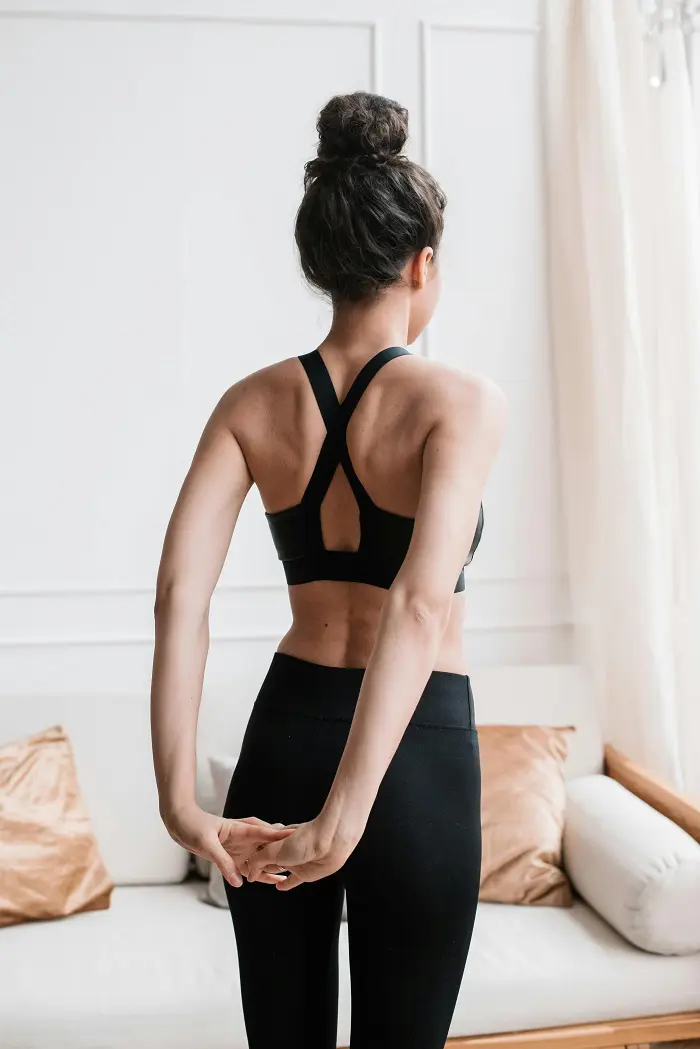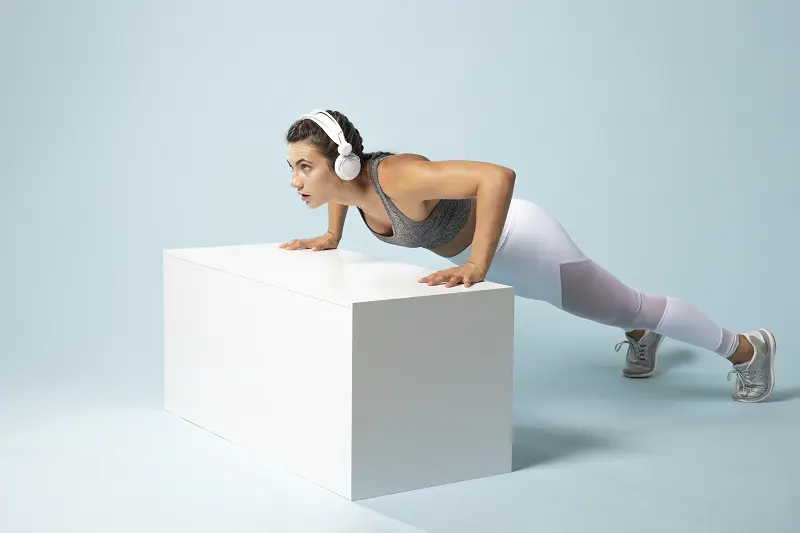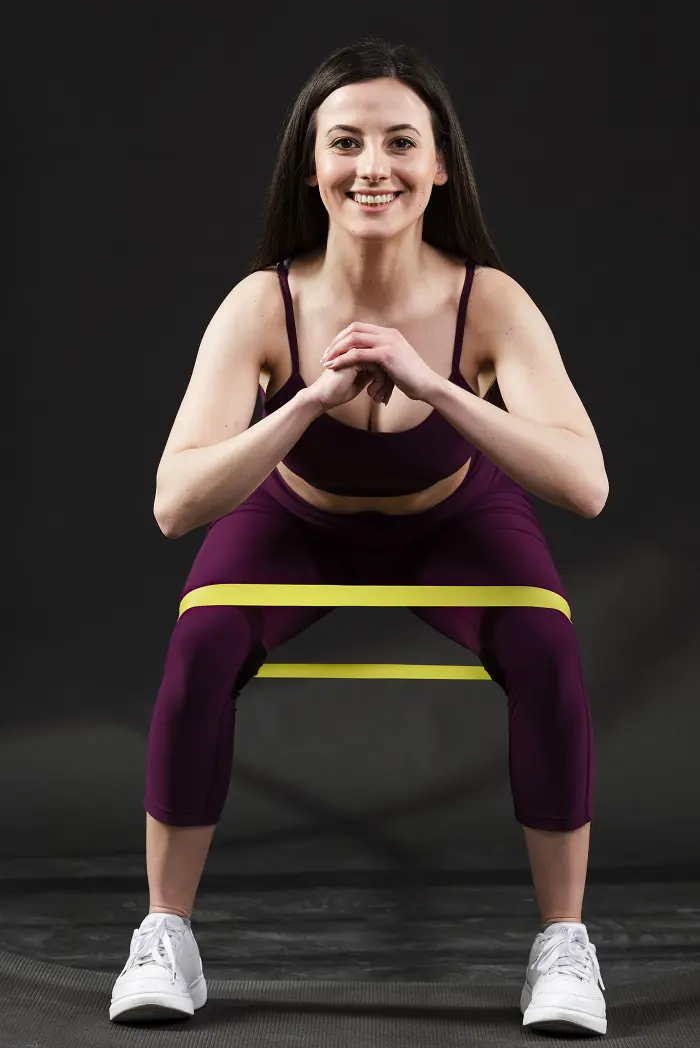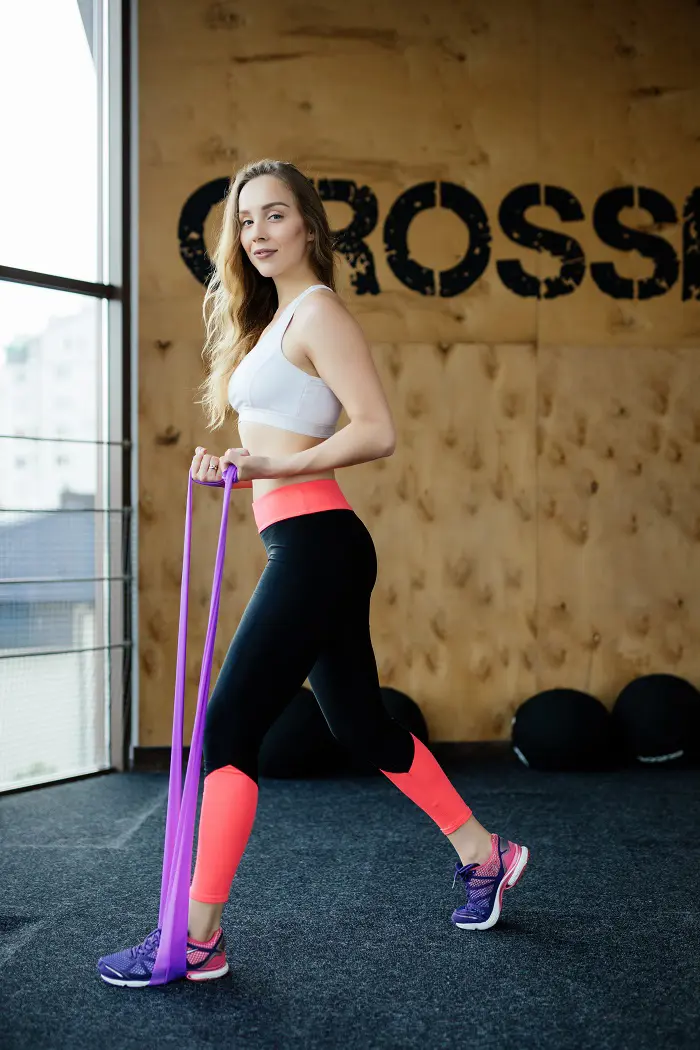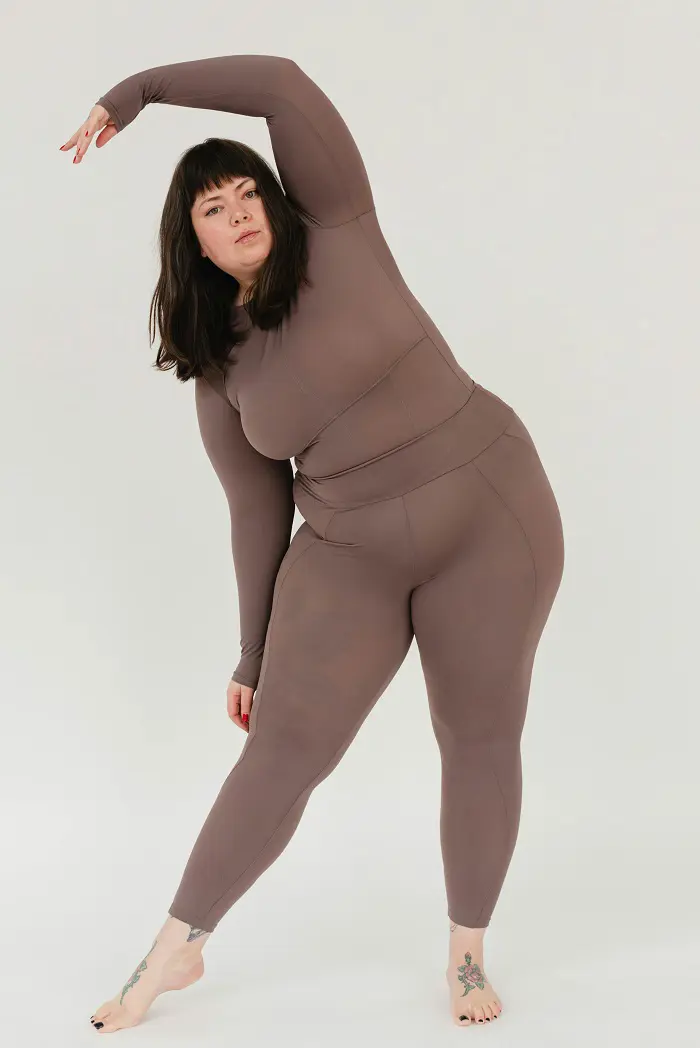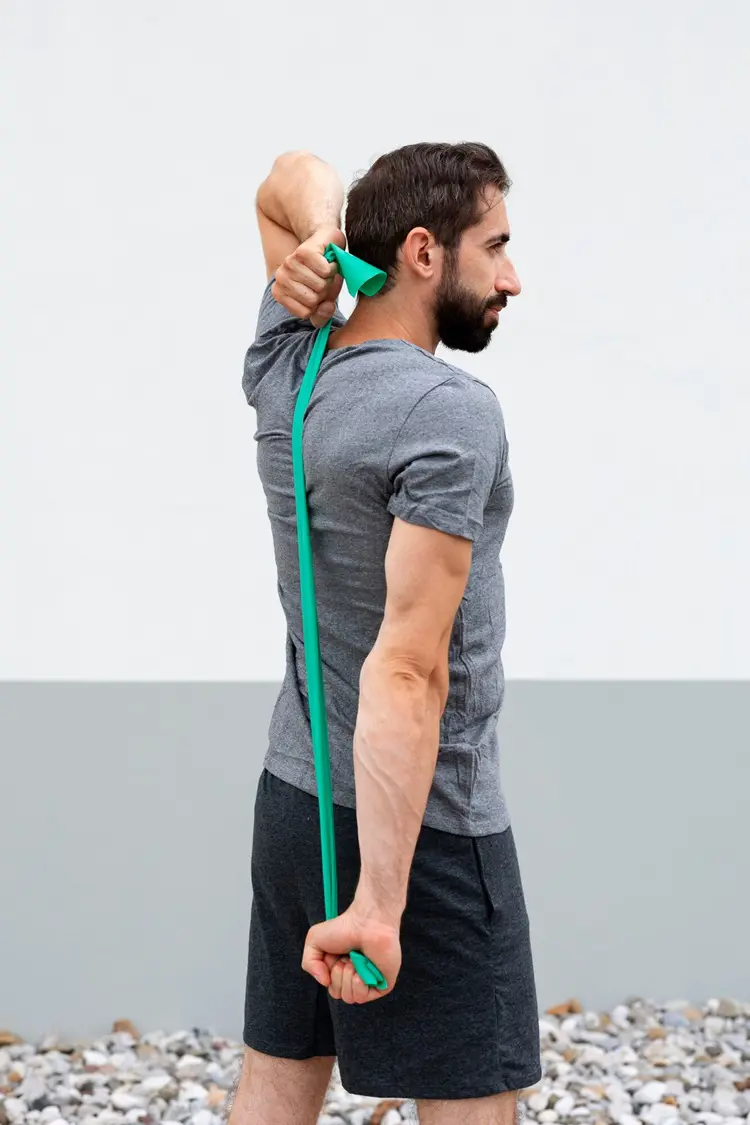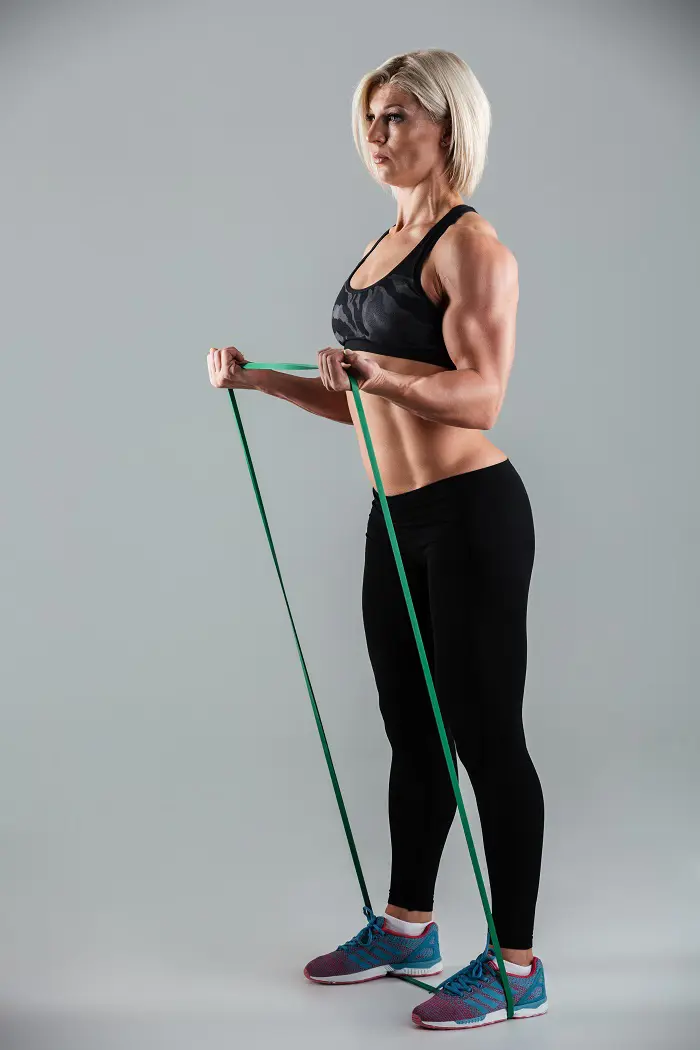9 Hamstring Stretches To Increase Flexibility
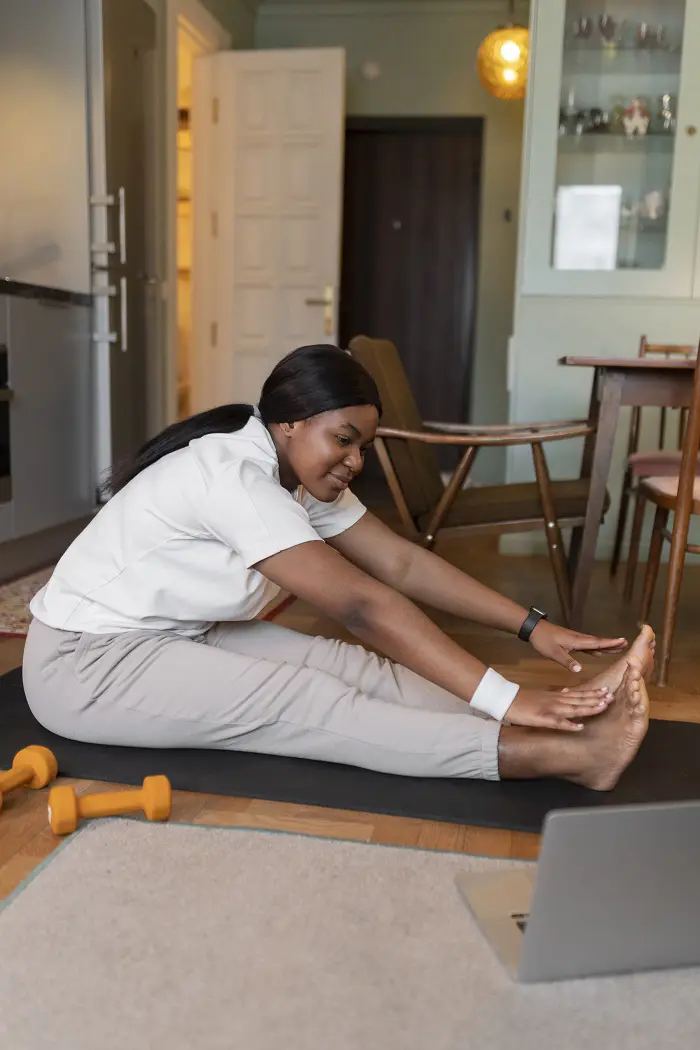
When the hamstring muscles become tight, it can hinder daily tasks and fitness routines. Over time, this issue can lead to aching and burning sensations in the lower body.
So, stretching the hamstrings becomes crucial for promoting loose muscles, enhancing flexibility, and creating a healthy lower body for sports and other physical activities. Now, let’s look at the 9 best hamstring stretches:
1. Simple Hamstring Stretch
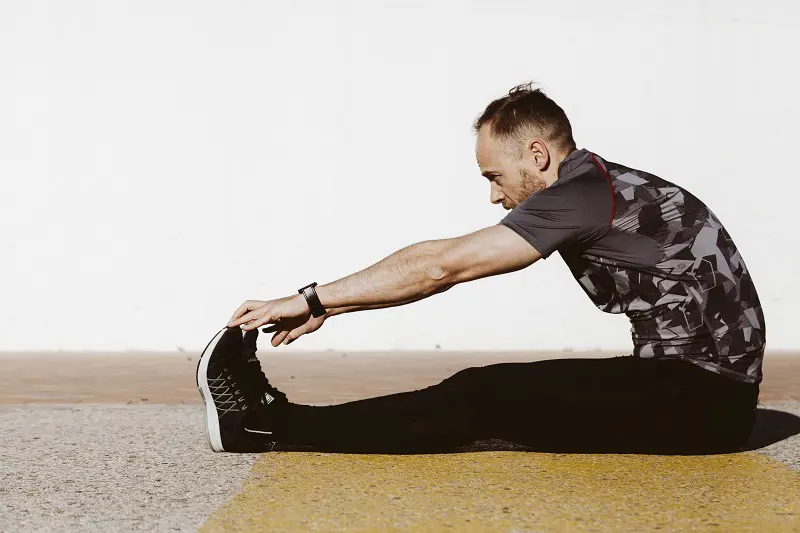
Begin the hamstring stretching routine with this simple and well-known stretch to enhance muscle flexibility and relieve tightness. This activity requires you to sit on the ground with both legs forward. If you suffer from lower back pain, you should avoid this activity.
Steps To Do It:
- Roll out a mat on the floor and sit on it with the legs straight out in front of you.
- Don't bend your knees throughout the exercise, and point your toes up toward the ceiling.
- Now, start extending your arm forward, trying to touch the feet.
- Also, bend your upper body forward, aiming to bring your head toward your knees.
- Once you’re comfortably stretched forward, hold this pose for 30 seconds.
- Go back to the original position and repeat 4-5 times.
2. Seated Hamstring Stretch
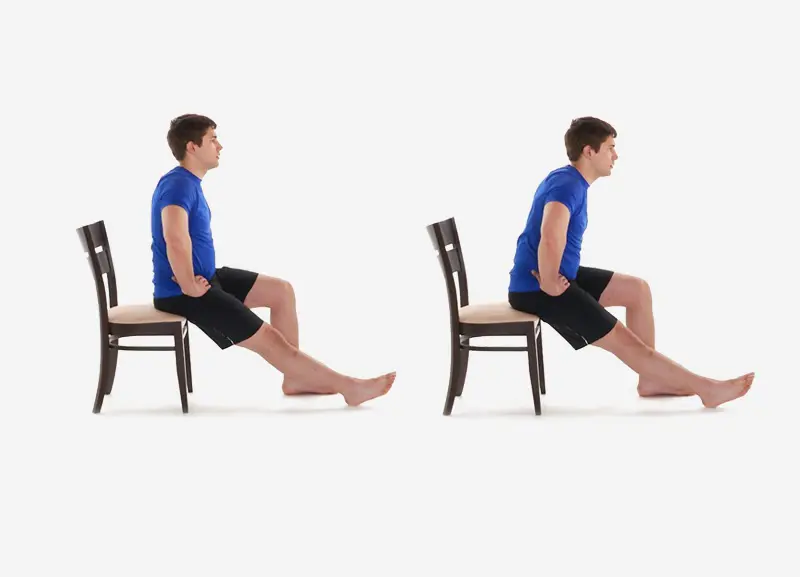
If you seek to improve your posture while comfortably stretching your hamstrings, a seated stretch can work wonders. This stretch is especially helpful for older adults who may find standing workouts more challenging.
Steps To Do It:
- Sit on a chair, preferably on the edge, with both feet flat on the floor. Maintain the feet hip width apart as well.
- Now, straighten the left leg forward, with heel touching the ground and the toe pointing upwards.
- Keeping your back straight, lean forward and press down on your left hamstring with your hands.
- Remain in this pose for 30-40 seconds, taking deep breaths throughout.
- Return your leg to the starting position, then repeat the process with the other leg.
3. Doorway Hamstring Stretch
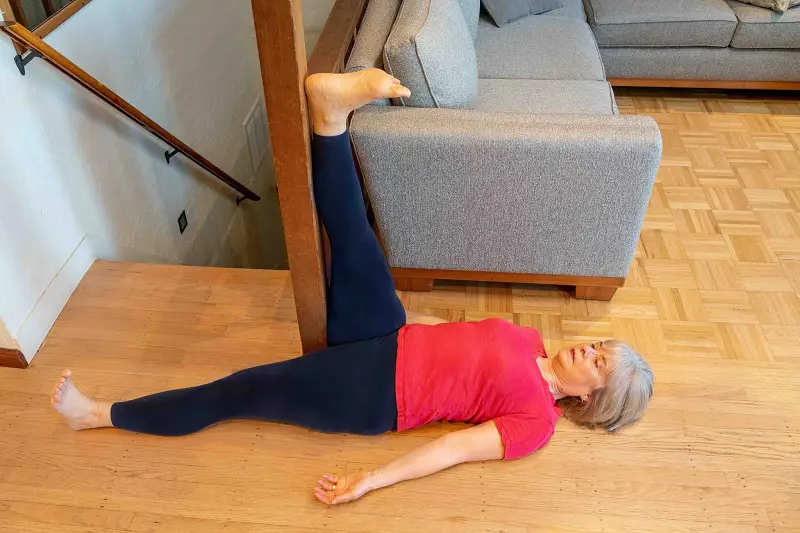
Another fantastic stretching exercise for hamstrings, it is helpful for improving flexibility in the legs, loosening tight muscles, and making activities like squats and jogging easier.
To do this low-impact stretch, there is no need for any complex gym equipment; just a little space in your home and a doorway is required to complete the exercise with the correct form.
Steps To Do It:
- Lie down on the floor near a doorway with enough space to keep your other leg extended straight ahead.
- Raise the right leg and place it on the doorway without bending the knee.
- Maintaining a straight right leg and following proper breathing techniques, slowly press the hamstrings with your hands.
- Hold this stretch for 30 seconds. Or you can press up to a minute as well.
- Repeat this process for 5-7 times and then switch to the other foot.
- Go for 2 sets regularly to develop strong, flexible hamstrings.
4. Hurdler Hamstring Stretch
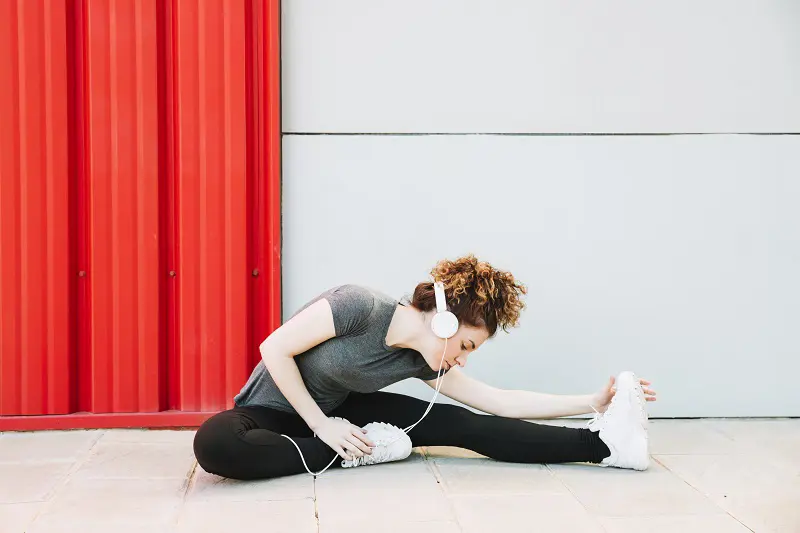
Done on the floor just like the first exercise on this list, the hurdler stretch has been popular for decades among runners and other track athletes.
This stretch targets not only the hamstrings but also the hip flexor muscles, providing a solid workout for the hip area as well. Just remember to be cautious if you have knee pain, as this stretch can put extra stress on the joints.
Steps To Do It:
- Begin by sitting on the floor with the right leg straight before you.
- Next, bend the left leg at the knee while placing the sole of the left foot against the right thigh.
- Start leaning the upper body forward as you descend, keeping your back flat throughout the entire movement.
- You must also extend the arms forward by touching the toes or placing the palms to the sides.
- Remain in this stretched pose for 20-30 seconds.
- Perform the same process for the left leg.
5. Towel Stretch
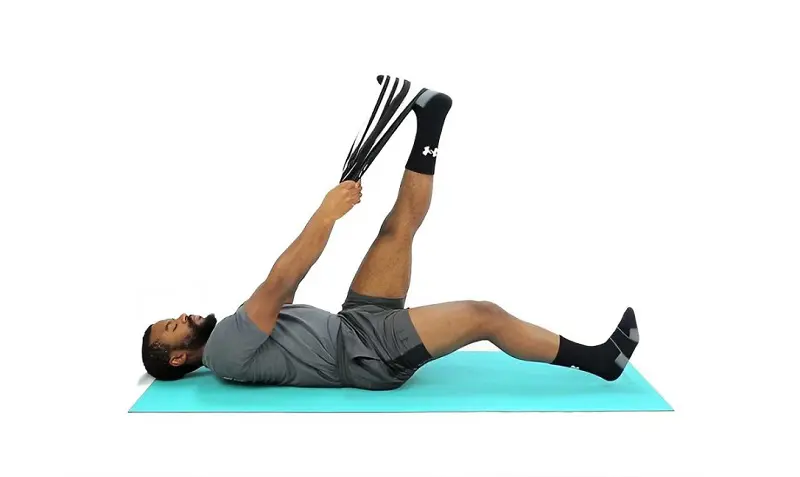
Fantastic for relieving tightness in our hamstring muscles, the towel stretch is easy to do, and we may adjust intensity by loosening our grip or pulling the towel tightly.
Be careful not to pull too hard since this could strain hamstrings and lead to injuries. The best way to benefit from this stretch is to build up gradually, slightly increasing the towel pull over time.
Steps To Do It:
- Lie down on the floor on your back with legs straight and back flat.
- Raise the left leg to the top without bending the knee.
- Once at the top, wrap a towel around the feet.
- Gently pull the towel toward you, stretching hamstrings and other leg muscles.
- Engage the core and avoid locking the knees as it could cause injury.
- Continue pulling down the towel for 30-40 seconds.
- Alternate the leg and repeat this stretch 4-6 times for each leg.
6. Standing Hamstring Stretch
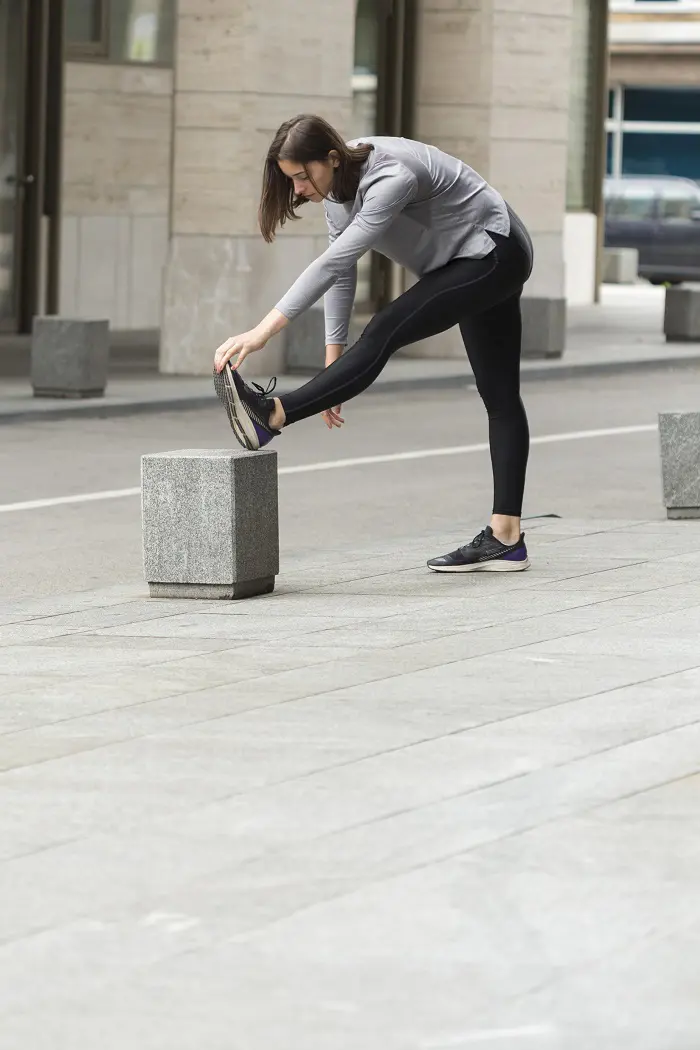
An easily accessible stretch that we can do anywhere - at home, gym, or office - it targets not only the hamstrings but also the calves, glutes, and back muscles. This makes it one of the simplest full body stretches to do when we’re in a hurry.
It's also great for warming up before going for heavier exercises like squatting and running.
Steps To Do It:
- Stand tall with a straight back and relaxed shoulders.
- Place your left leg in front of you with the heel as support, keeping the toes pointed upward.
- Next, slightly bend your right knee and lean your upper body forward.
- While leaning forward, place both hands around the hamstrings of the right leg.
- Press the hamstrings with your hands and hold this stretch for 30 seconds.
- Return back to the original position and then switch the leg.
- Conduct this stretching exercise for 4-7 reps (for each leg).
7. Foam Roll Hamstring Stretch
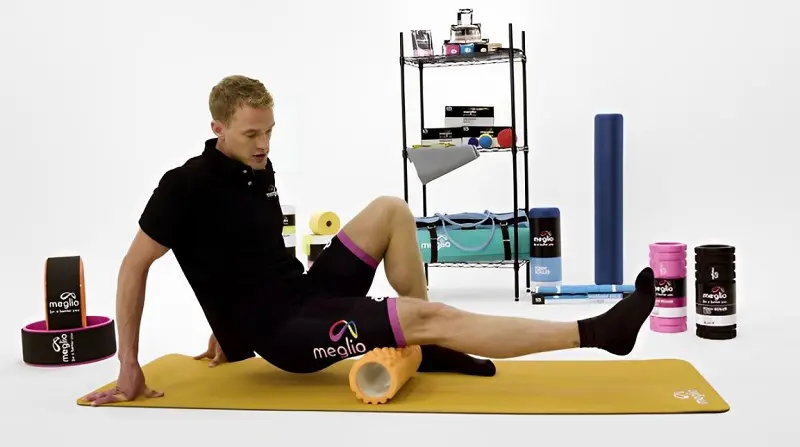
When rolling in this stretch, it’s crucial to avoid putting too much pressure on the back of your knee, as this area is sensitive. It’s also better to roll in small sections, focusing on tight spots instead of working the entire leg.
Utilize this foam roll stretch every day as part of your warm up or cool down workout routine. It ultimately helps to boost flexibility and blood circulation.
Steps To Do It:
- Lay down a comfortable mat on the floor and sit on it. Maintain straight legs and flat back.
- Place a foam roller under the hamstring of the right knee and fold the left leg.
- Place your hands behind you with the palms pointing backward.
- Now, lift the hips by pressing the palms.
- Next, start shifting your body back and forth over the foam roller.
- Keep the roller focused on the hamstring area only - avoid rolling over the entire leg.
- Perform this movement for 2-3 minutes and then switch to other leg.
8. Standing Forward Bend
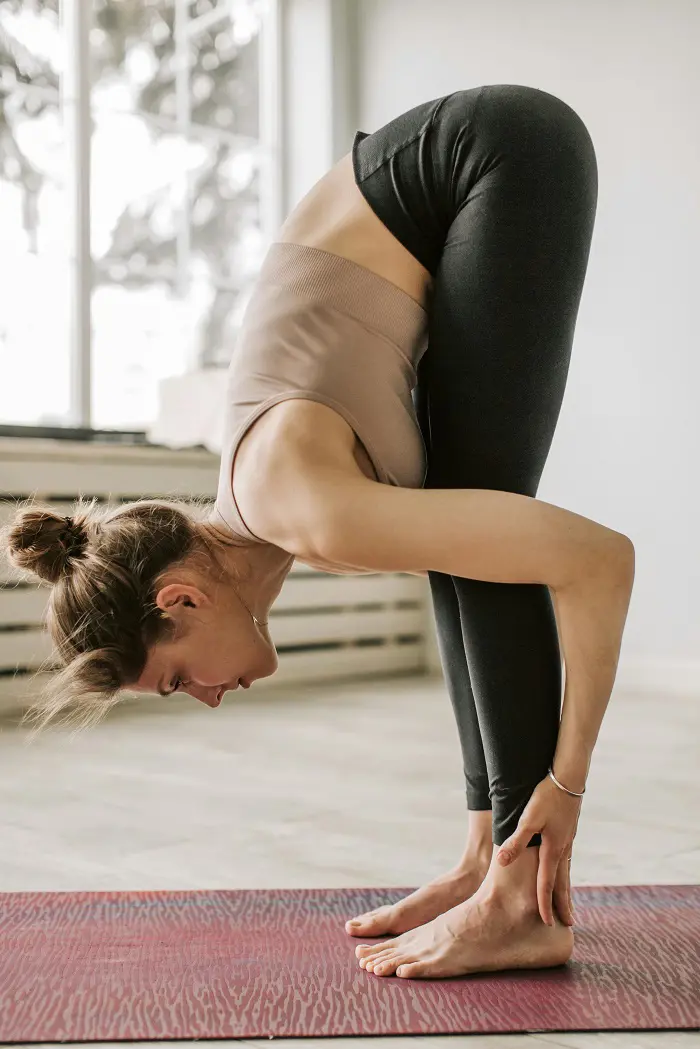
One of the best hamstring muscle stretches, the standing forward bend is a powerful and enjoyable activity that activates multiple muscle groups, including the hamstrings. The depth of the stretch depends entirely on gravity and the person’s level of flexibility.
This stretch is not ideal for people with acute back pain, as it involves bending the upper body to its maximum limit. However, with regular practice, we would get closer to touching our knees with our head.
Steps To Do It:
- Stand upright with the feet flat and close to each other. The arms should be placed overhead.
- Let’s take a deep breath and start folding our upper body slowly and steadily. Let our hands move down in sync with our upper body.
- We should lower down until we reach a comfortable position, stopping if we need to bend our knees to go further.
- Also, we must not forcefully try to touch our head with our legs. This could result in muscle strain in our lower back.
- Remain in this folded position for 30 seconds.
- Remember to repeat this stretch for 8-10 reps. Over time, this will increase the overall flexibility of the body.
9. Kneeling Hamstring Stretch
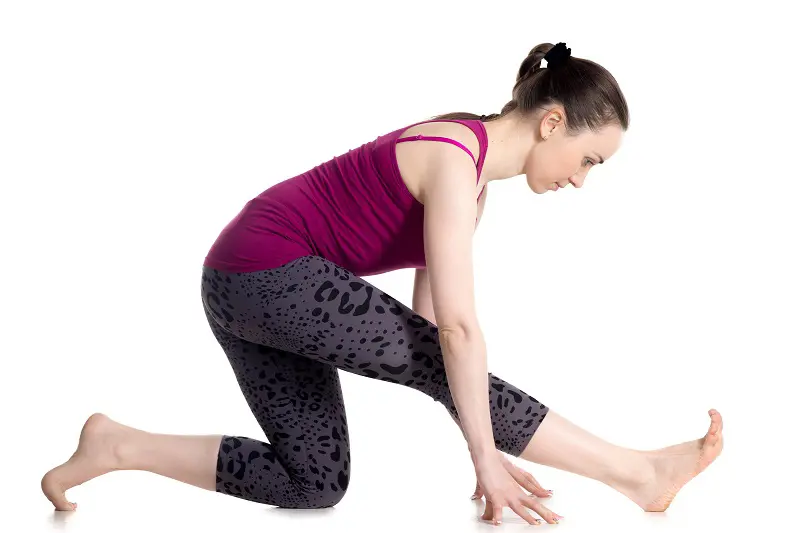
Considered one of the best stretches for hamstrings, the kneeling version is quite simple to get into. Just sit with your knees bent to start this stretch.
This stretch is capable of increasing flexibility in the legs, reducing tension in the hamstring muscles, and improving balance. You can practice it anywhere at any time with no equipment.
Steps To Do It:
- Begin the stretch by getting into a kneeling position.
- Now, you need to raise the left leg in front of you. The right leg should still be in the bent pose.
- Straighten the left leg and put your hands in the hamstring area.
- Press the hamstrings down with your hands.
- You can also place both hands at the sides and simply lower the leg toward the floor.
- When you feel that good stretch, hold that position for 30-45 seconds.
- Then, bring the left leg back to the kneeling position.
- Alternate between each leg for 2-4 minutes.
When To Do Hamstring Stretches?
People may wonder when’s the best time to practice these stretches to get the most out of them. One of the ideal times is to include these stretches as part of your warm up or cool down routine. During these periods, stretching the hamstrings might be especially beneficial for keeping the muscles active.
If you're looking to increase leg flexibility, daily practice may be the way to go. Even just a few minutes of stretching can make you healthier than skipping it altogether.
However, if you’re dealing with pain in your hamstrings or lower back, some exercises might not be optimal due to health concerns. If you’re determined to continue, contact a doctor first to understand the appropriate schedule and maximum intensity.
Benefits Of Hamstring Stretches
Hamstrings stretches are great for making the lower body flexible so that it becomes easier to handle everyday tasks. With these stretches, activities like running, jogging, and other sports become less bothersome.
Here are some of the major benefits of doing these stretches:
1. Improves Flexibility
Many people include hamstring stretches in their daily routine to boost lower body flexibility and promote a better range of motion in the hips.
Since these muscles are essential for bending the knee properly, neglecting to stretch them can eventually lead to stiffness and make even moderate activities painful. A flexible body supports physical fitness and keeps us free from sudden soreness or sprains.
2. Reduces Lower Back Pain
Another fantastic benefit of doing these stretches is that they help prevent lower back pain. When we have tight hamstrings, the pelvis gets pulled, which in turn puts pressure on the lower back.
Hence, stretching the hamstrings can help relieve this pressure and allow the pelvis to function smoothly.
3. Enhances Athletic Performance
Improving the flexibility of the hamstrings automatically means better athletic performance since our leg muscles begin working more effectively. Hamstrings are essential for bending or flexing the knees properly, so athletes cannot neglect this area.
Moreover, hamstring muscles are also crucial in helping the gluteal muscles extend the leg during running. A healthy hamstring implies powerful performance in various sports like football, basketball, and tennis.
4. Reduces Risk Of Injuries
Stretching our hamstrings daily can loosen up muscles, reducing strains and tightness. This, in turn, helps lower the risk of injuries like soreness or muscle tears during everyday activities.
We should practice a variety of stretches - some static and others dynamic - to boost our physical health and ensure we don’t get fatigued / injured after moderate activities like cycling or jogging.
5. Promotes Better Posture
We might find it surprising that stretching a part of our lower body can help balance our upper body’s posture. However, tight hamstrings can significantly impact our posture.
When the hamstrings become tight, they can pull the pelvis backward, flattening the natural arch of our back. This can result in various issues, including poor posture while sitting and standing. To prevent this problem, stretching the hamstring muscles is crucial.
Tips Before Stretching
1. Perform Light Warm Ups
Although some of the aforementioned stretches can serve as warm up exercises before diving into a heavier workout, it's still beneficial to include light warm-ups before doing exercises like the seated fold and hurdler stretch.
Light activities such as walking or dancing are great for getting the muscles ready for a proper stretch. These activities also raise your heart rate, enhancing blood and oxygen flow to various muscles in the body, including the hamstrings.
2. Practice With Slow And Controlled Motions
It’s important to note that these stretches should not be done with wild swings, fast movements, or unnatural momentum. While it may seem like an intense practice to stretch quickly and forcefully, it doesn't provide any real benefits.
Meanwhile, slow and controlled movements properly engage the targeted muscles, offering a better overall experience for making them more flexible and strong.
3. Follow Proper Techniques
While doing any particular type of stretching exercise, follow the proper techniques for each activity carefully. Knowing correct body movements and hand placements helps to conduct the exercises effectively, making your reps and sets valuable.
4. Stretch Both Sides Equally
If you’re doing stretches that require alternating body movements, one good tip is to give equal time to both sides. For instance, when stretching the hamstrings while seated or standing, you would typically focus on one leg at a time. Be sure to give equal reps to each leg. This approach helps develop the muscles on each side uniformly.
Recent posts
Exercises
Exercises
10 Trapezius Stretches To Relieve Muscle Stiffness
Responsible for rotating the scapula, the trapezius muscles are triangular in shape and located in the upper back. They also play a role in extending the neck and contribute to arm stability. Since this muscle does a lot of work, it can become stiff ...
Exercises
20 Different Variations Of Push Up For Beginner To Experts
Pushups are commonly practiced for building upper body strength - and for good reason. They could also be the very first workout we ever tried. No expensive equipment is needed, and it can be done from the comfort of our home. If we are getting bored...
Exercises
20 Squat Variations For Every Fitness Level
Squats have been a popular exercise for many fitness enthusiasts. They are effective for strengthening key lower-body muscles like the glutes, hamstrings, quadriceps, and calves. Practicing them daily can lead to a toned butt - an aesthetic goal for ...
Exercises
12 Golfers Elbow Exercises For Quick Pain Relief
Golfer’s elbow, aka medial epicondylitis, happens when the tendons connecting your forearm muscles to the bony inside part of your elbow get inflamed. This can cause pain and throw off your physical well-being. To tackle this, there are plenty ...
Exercises
11 Exercises To Gain Weight For Bulking Up At Home
Bulking up at home is possible with the correct exercises and a well-structured diet. You do not need any fancy equipment or a complex setup to perform these workouts. Focusing on compound movements and gradually increasing intensity will maximize yo...
Exercises
12 Serratus Anterior Exercises For Better Shoulder Health
The serratus anterior, aka the boxer muscles, plays a key role in shoulder stability and range of motion. Strengthening this muscle not only enhances mobility but also helps prevent injuries and improve posture. Including targeted workouts in your fi...
